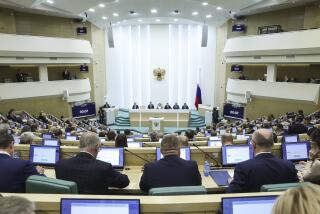CIA Conducts a Cyber-War Exercise
- Share via
WASHINGTON — The CIA is conducting a war game this week to simulate a Sept. 11-like electronic assault on the United States.
The three-day exercise, known as “Silent Horizon,” is meant to test the ability of government and industry to respond to escalating Internet disruptions over many months, according to participants. They spoke on condition of anonymity because the CIA asked them not to disclose details of the sensitive exercise, which is taking place in Charlottesville, Va., about two hours southwest of Washington.
The simulated attacks take place five years in the future, perpetrated by a fictional alliance of anti-American organizations that include anti-globalization hackers.
The national security simulation is notable because its premise -- that a cyber-attack affects government and parts of the economy on the scale of the 2001 suicide hijackings -- runs counter to assurances by U.S. counterterrorism experts that such effects from a cyber-attack are highly unlikely.
“You hear less and less about the digital Pearl Harbor,” said Dennis McGrath, who has helped run three similar exercises for the Institute for Security Technology Studies at Dartmouth College.
“What people call cyber-terrorism, it’s just not at the top of the list.”
The CIA’s little-known Information Operations Center, which evaluates threats to U.S. computer systems from foreign governments, criminal organizations and hackers, is running the war game, in which about 75 people -- mostly CIA members, but also current and former U.S. officials -- gather in conference rooms and pretend to react to computer attacks.
The government remains most concerned about terrorist explosions, radiation and biological threats. FBI Director Robert S. Mueller III warned earlier this year that terrorists were increasingly recruiting computer scientists, but he said most hackers “do not have the resources or motivation to attack the U.S. critical information infrastructures.”
More to Read
Sign up for Essential California
The most important California stories and recommendations in your inbox every morning.
You may occasionally receive promotional content from the Los Angeles Times.










